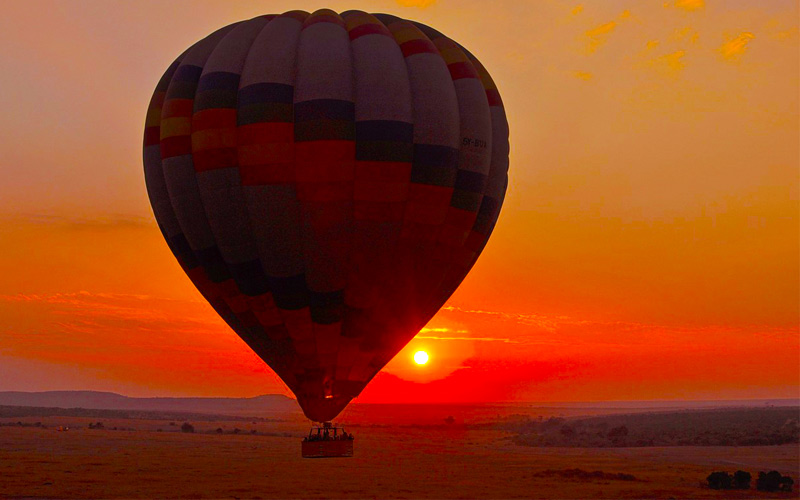A safari through Tanzania is always special, but a camping safari in Tanzania arguably provides the most immersive experience into the great East African wilderness.
While the experience of being separated from the untamed elements by only a thin sheet of canvas may be daunting for some, others find the thought of being one with nature around them thrilling.
Camping in the Seronera region of the Serengeti and watching the wildebeest migration up close was a remarkable experience for me - one I wouldn't have otherwise had if I opted to stay in a nearby lodge or hotel.
In this article, you'll get my best hacks for the ultimate Tanzanian Camping Safari and all the important travelling and cost factors that come with it.
Let's begin.
My Quick Takeaways:
Thinking of a camping safari in Tanzania? Here’s what you need to know at a glance:
- Immersive Experience: Camping safaris offer a raw and authentic adventure, bringing you closer to nature and the African wilderness.
- Budget-Friendly: A great way to experience Tanzania without breaking the bank, with costs starting at around $200 per person per day, including transport, park fees, guides, and meals.
- Best Time to Go: The dry season (June to October) offers the best wildlife viewing and more predictable weather conditions.
Top Camping Spots:
- Serengeti National Park: Campsites like Angaata Seronera, Ikoma Gate, Ngiri, and Pimbi offer great access to prime wildlife areas.
- Tarangire National Park: Stay among iconic baobab trees and experience abundant wildlife.
- Wildlife on Your Doorstep: Camping within national parks means waking up to the sounds of the wild and possibly spotting animals right from your tent.
Ready to learn more about a camping safari in Tanzania? Let's get into it.
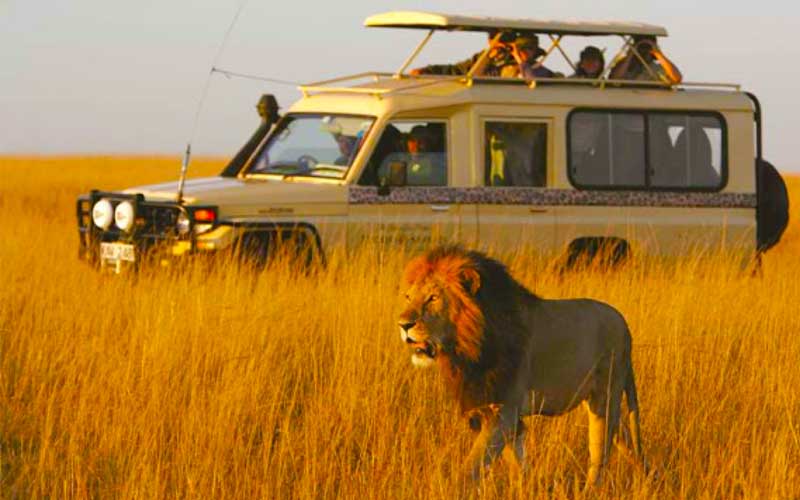
Plan your Safari experience
Check out these amazing deals on epic safari experiences now.
Tanzania Camping Safari
Just like the first explorers to venture into Africa, a camping safari takes guests on an untamed journey through the rugged wilderness.
With the thrill of wild animals brushing past your tent with no fences or armed guards in most campsites, pitching up camp is an exhilarating option that is definitely not for the faint-hearted.
If you’re an adventure-seeker on a budget or a glamping savant looking for a luxury option, the biggest advantage of a camping safari is without a doubt the cost.
Travellers can save hundreds of dollars without compromising in the slightest on realizing their wildest safari dreams.
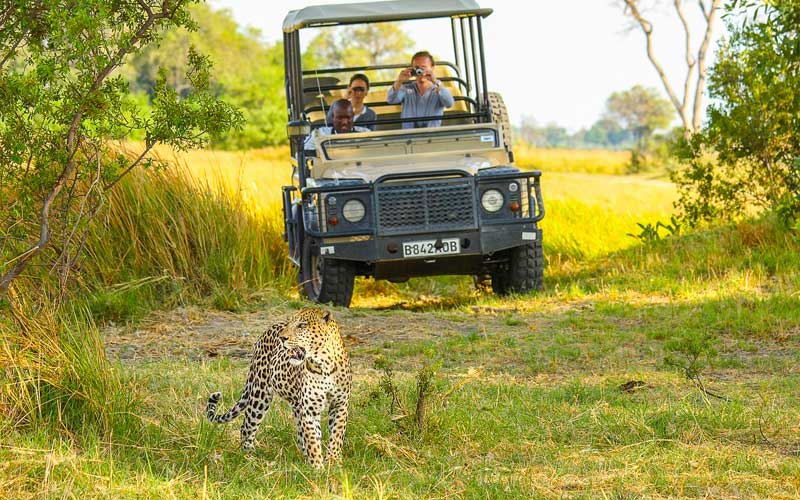
Best Time for a Tanzania Camping Safari
Like most trips to Tanzania, the best time for a camping safari is during the dry season - when travelling is easier and there's more wildlife and flora to see.
While average temperatures don’t change drastically throughout the year in Tanzania, the East African climate is notably marked by a dry and wet season.
Dry Season
The best and most popular time to visit East Africa is generally from mid-June to October. As East Africa’s dry season, this time of year has the most predictable weather and provides ideal safari conditions in Tanzania.
While early mornings and evenings might be cold, the temperature during this season is fairly predictable. Thermometer readings are often around 23°C/73°F, reaching a high of 28°C/82°F in the coastal areas.
Wet Season
In the wet season, the dry landscapes of Tanzania is transformed into a lush, green wonderland.
Temperatures increase during this period and usually range between 24°C/75°F and 27°C/81°F, reaching highs of 30°C/86°F along the coast. There are two types of rainy periods in this season:
- Short rains (November-December): You can expect thunderstorms to take place often in the afternoons.
- Long rains (March-April): The long rains usher in the peak of the wet season, which is usually characterised by hot and humid conditions.
Although camping in the rain can be magical for a day or two, as most seasoned campers will tell you, setting up and down your campsite in the rain is not for the faint-hearted.
The rainy season also sees the wildlife scattering across the plains and can make big-game spotting difficult.
See more on the best seasons to visit Tanzania.
Which tour? Here are 5 Serengeti safari tours I highly recommend:
- Group Camping Safari that includes Tarangire and Ngorongoro (4 days)
- Budget Serengeti Safari (5 days)
- Scenic Northern Tanzania Safari (7 days)
- Serengeti Trail that includes Ngorongoro (8 days)
- Best of Kenya and Tanzania (incl. 6 national parks) (12 days)
See more Serengeti safari deals.
Where to Go on a Tanzania Camping Safari
The best and most popular places to go on camping safaris can be found in Northern Tanzania as opposed to the Southern parts.
The Northern Tanzania safari circuit is comprised of:
- Serengeti
- Ngorongoro Crater
- Lake Manyara
- Tarangire
- Arusha
- Kilimanjaro National Park
The Southern Circuit is made up of:
- Selous Game Reserve
- Ruaha
- Mikumi and Udzungwa Mountain National Park (two lesser-known parks on the circuit)
As the more popular safari destination, the Northern Circuit parks are generally more tourist-friendly and information is easier to come by when researching ideal locations and safari tours online.
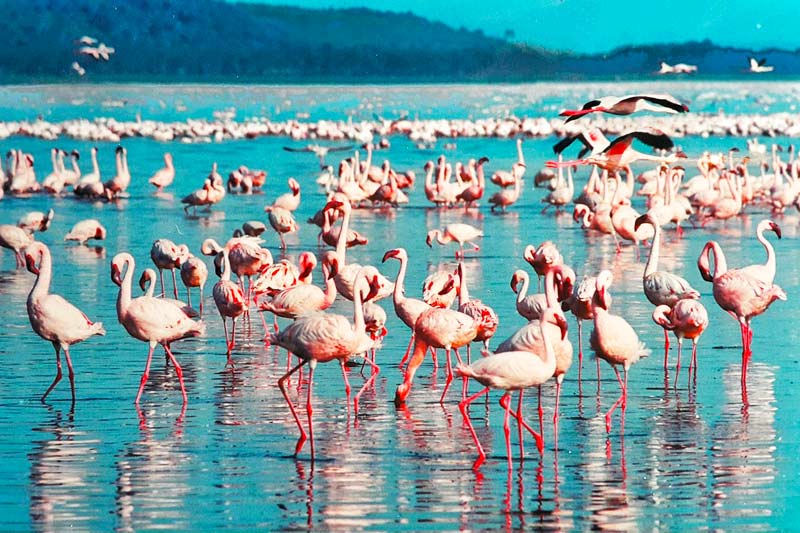
Northern Circuit Campsites
The highly-rated Migombani Campsite is found nestled high up in the Rift Valley, right on the doorstep of Lake Manyara. The site offers world-class facilities and is a haven for safari-goers.
Ngorongoro Simba Campsite is a large site located right on the rim of the crater. The views are impossible to beat and wildlife roams freely amongst the tents.
Tucked in amongst the colossal baobabs of Tarangire National Park is Tarangire Campsite. This hidden gem is home to an abundance of wildlife and is situated in one of the lesser-known Northern Circuit parks.
The best camping options inside the Tanzanian part of the Serengeti include the Angaata Seronera, Ikoma Gate, Ngiri and Pimbi Campsite.

Plan your Safari experience
Check out these amazing deals on epic safari experiences now.
Southern Circuit Campsites
Jongomero Camp offers a secluded, luxurious camping experience in the heart of the Ruaha National Park.
If you’re looking to experience camping at its finest, the eight beautifully thatched suites are permanently set up on wooden platforms overlooking the river won’t disappoint you.
River Valley Campsite in Iringa lies along the banks of the Little Ruaha River. As an oasis in the Tanzanian landscape, this camp can still be enjoyed on a budget.
With the Selous Riverside Camp being temporarily closed, Kumbu Kumbu Riverside Camp is one of the best choices when camping in the Selous Nature Reserve.
Spread along the beautiful Rufiji River, this campsite is intimate and very well maintained.
Simbamwenni Lodge and Camping is an ideal stopover campsite for travellers passing through the Southern Circuit.
Located just outside the town of Morogoro, visitors feel as though they are deep in the bush even though they are close to the main road.
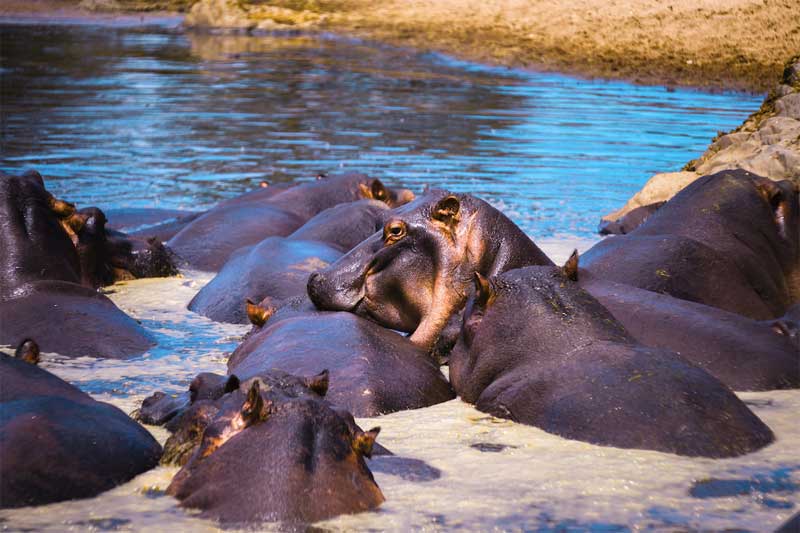
Beach Campsites
Peponi Beach Resort in Tanga is a mecca for holidaymakers and provides a plethora of adventures and activities for guests to get involved in.
Nestled in amongst the palm trees lining the beach, visitors to this well-appointed campsite can revel in diving and snorkelling, kayaking, fishing, hiking, biking and so much more.
The Horizon is another adventure-filled campsite located in Bagamoyo. The idyllic setting offers everything one could ever want on a Tanzanian beach holiday – from boat trips to dining experiences.
Located in the Saadani National Park, a unique nature reserve offering big game viewing with a border on the sea, is Tanganyika Coastal Campsite.
The enthralling experience offers the ultimate Tanzanian safari right alongside the beach.
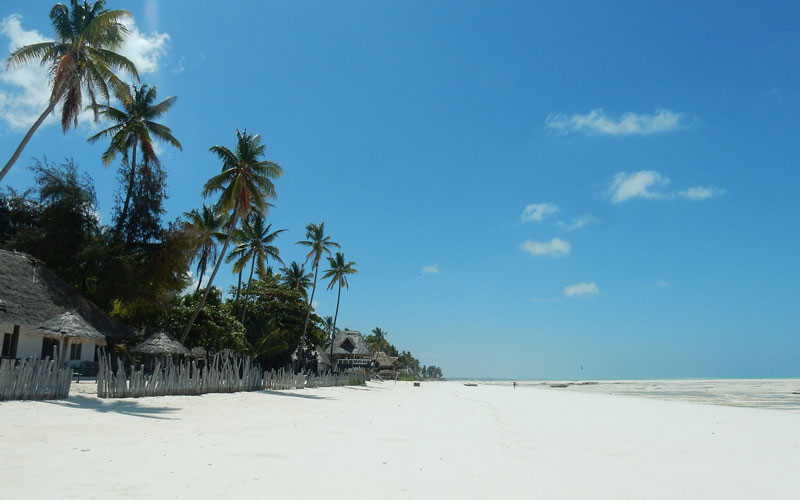
Requirements for a Tanzanian Safari
There are a number of vaccinations you should get before you travel to Tanzania. We recommend that you check with your local GP or travel clinic which vaccinations you require.
Certain vaccinations are required to enter Tanzania including Diphtheria-tetanus-pertussis, Measles-mumps-rubella (MMR), Hepatitis A and polio.
It is also highly advised to go on a course of anti-malaria medication and to pack some insect repellant.
Read more information in my guide to visas, vaccinations, and medication.

Tanzania Camping Safari Costs
Tanzania Camping Safaris typically cost anywhere from $5 to $60. These costs are determined according to three types of tiered camping accommodation available to tourists:
- Special campsites reserved by safari companies
- Public campsites run by the Tanzanian government
- Budget campsites outside major national parks
Special Campsites
Special campsites cost from US$59 per person per night. The best special campsites are often reserved by private safari companies.
These sights are very remote and basic but provide a true wilderness experience. If this is something you’d like to experience, head to the TANAPA and NCA head office in Arusha to try to pre-book a special campsite.
Choosing a Safari Company: It is vital to choose your safari company wisely – taking the time to do research based on reliable reviews is super important.
Once you’ve contacted your safari company, your itinerary will be tailor-made. It is widely recommended, however, to choose the typical safari packages as these are the most tried and tested and are popular for good reason.
Public Campsites
Public campsites managed by TANAPA cost roughly US$35 per person per night. When on a self-drive safari, these often don’t need to be booked and campers will be allocated to a campsite when entering a park.
Budget Campsites
Campsites outside of the national parks are much cheaper and only cost around US$5 to US$15 per tent.
Where to stay? Here are 7 of my favourite camping safari accommodation options in Tanzania:
- Serengeti Mawe Camp
- Tarangire Baobab Tented Camp
- Selous Africa Safari Camp (near Mtemere main gate and airstrip)
- Mikumi Faru Tented Camp (Morogoro)
- Karatu Tented Lodge (near Ngorongoro and Lake Manyara)
- Pakulala Safari Camp (Ngorongoro)
- Simbamwenni Lodge and Camping (Morogoro)
See more Tanzania camping safari accommodation options.
Best Types of Tanzania Camping Safaris
There are two types of Tanzanian camping safaris best suited for travellers:
- Guided Camping Safaris
- Self-Drive Safaris
These types guarantee safari goers with high levels of comfort and adventure in equal measures.
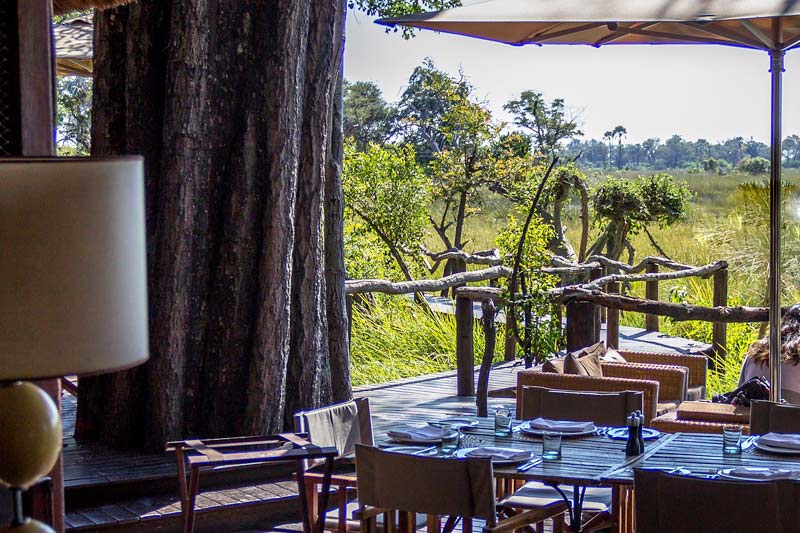
Guided Camping Safaris
Less Stress, Remote Locations and More
The most intimidating part of a self-navigated camping safari for most travellers is the planning and logistics required, as well as lacking the right equipment. If that’s the case, a pre-planned and guided camping tour ticks all the right boxes.
Nothing quite compares to the experience of pitching camp in places you would have never otherwise been able to find on your own.
Special campsites are bought on a bidding system by safari companies before the safari season, allowing access to some of the most unique and breathtaking locations on earth.
Most camping safaris range from 3-11 days. A minimum of five days is suggested to ensure that you maximize your time within each park.
Below is a handy spreadsheet outlining what's included in a guided camping safari:
What's Included | Description |
|---|---|
Transportation | Usually a 4x4 vehicle provided by the safari company. Transports safari-goers with ease and comfort through the remote Tanzanian wilderness. Sufficient camping equipment, food and drinks stored inside the vehicle during the journey. |
Meals | All provided by the safari tour company. Many tours even provide a chef to guarantee the food's high-quality and also eliminates the necessity of finding shops in the middle of East Africa. |
Camping Gear | Provided by the safari company (except for personal items). Usually tents, sleeping bags, safari chairs and a fold-out table for mealtimes. The tour guide even takes care of the overall camping set-up for you. |
Self-Drive Safaris
A budget camping safari often appeals to the most adventurous at heart.
Your chosen safari company will provide a rental car and vital information to undertake an epic self-drive road trip through Tanzania.
This is a great option for those who want to choose their own route through East Africa and perhaps do some spontaneous camping and sightseeing.
The company also provides rental camping gear, giving travellers great flexibility in choosing destinations. Quotes and bookings can be managed through their online reservations.
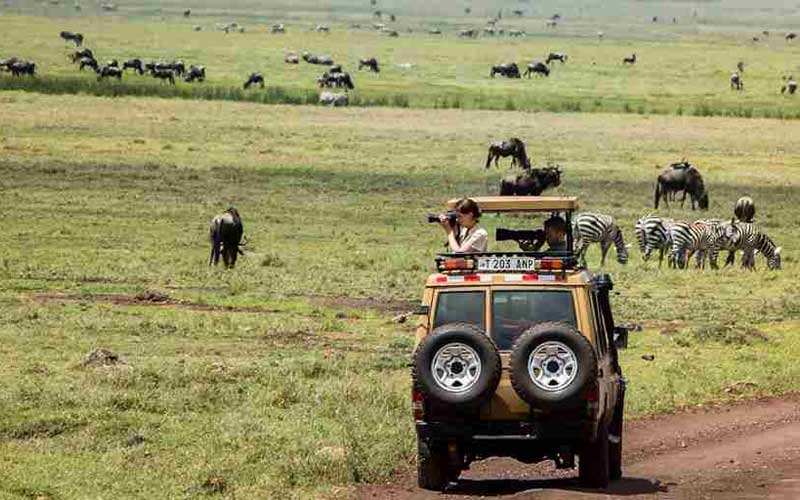
Budget Camping Essentials
If you're camping on a budget, you'll need a few essentials and creature comforts for the journey.
For sleeping and general resting periods in-between tours and activities:
- Tent
- Mattress
- Bottled water and food
- Warm sleeping bag
- Additional blanket for cold nights
- Pillow
When you're up and about, or just enjoying some good old-fashioned 'down time' in-between safari tours and activities, you'll definitely need these items:
- Dishwashing liquid and washing powder
- Charcoal or wood
- Firelighters or matches
- Cutlery and crockery
- Camping fridge
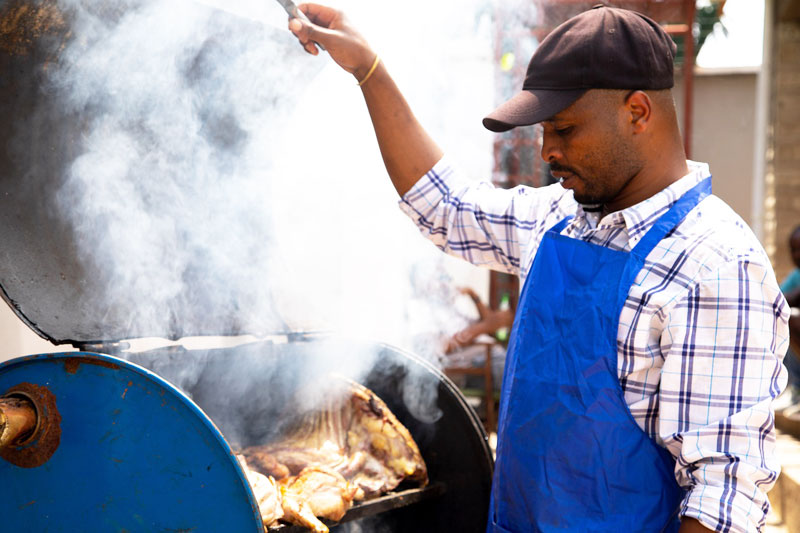
Bags and Day Packs
When you're on the go during your safari tour, you'll need to carry a few things around with you like:
- 80-90L duffle bag
- 20-30L day pack
- Travel bag organisers (optional)
General Checklist
You'll need your combination of duffel bags, day packs and travel bag organisers to carry these items to and from camping sites and during your tours:
- Head torch and extra batteries
- Quick-dry towel
- Toilet paper (many campsites don’t provide this)
- Baby wipes
- Sunscreen
- Deet insect repellent
- General medication (Imodium, Paracetamol)
- Reusable water bottle
Technology
It just wouldn't be a holiday, even on a camping safari, if you didn't bring these modern amenities with you:
- Camera
- Power bank
- Spare batteries and camera memory card
- Travel adaptor
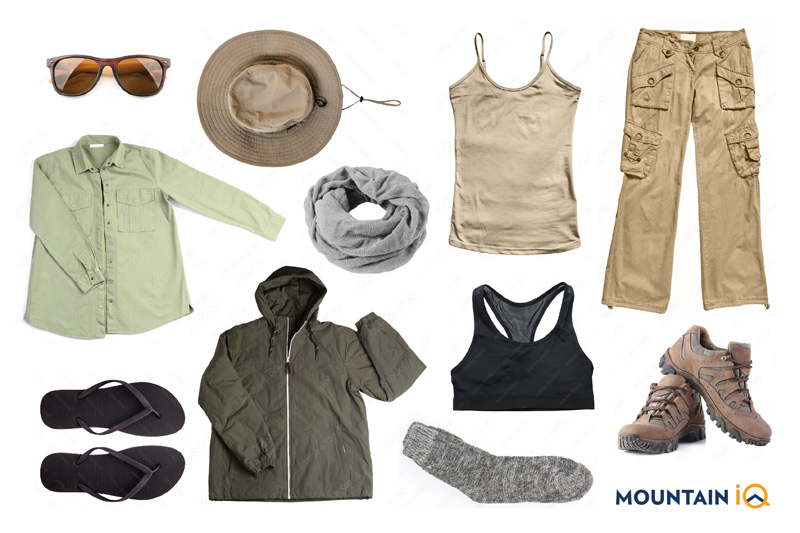
Safari Clothes for Comfort and Protection
As a place of extremes, East Africa can be as uncomfortably cold in the morning as it can be hot in the afternoons. So make sure that you pack the following kinds of clothing for your camping safari:
- Comfortable short sleeved and long-sleeved safari shirts
- Long pants that can be rolled up
- Shorts
- A dress / smart shirt if you feel like dressing up at night
- Underwear (including sport bras for women)
- Windbreaker / rain jacket
- Warm / fleece jacket
- Scarf
- Swimsuit
- Simple, lightweight safari shoes
- Hat
Other Bits and Bobs
These items, while not essential, will still make your camping safari convenient and more enjoyable:
- Zip-lock bags for important possessions (passport, money, phone, etc.)
- Passport, visa, insurance, yellow fever card (if applicable)
- Small lock for your duffle bag
- Binoculars
- Sunglasses
And you're good to go! For more information, read my safari packing and safari clothing guide.
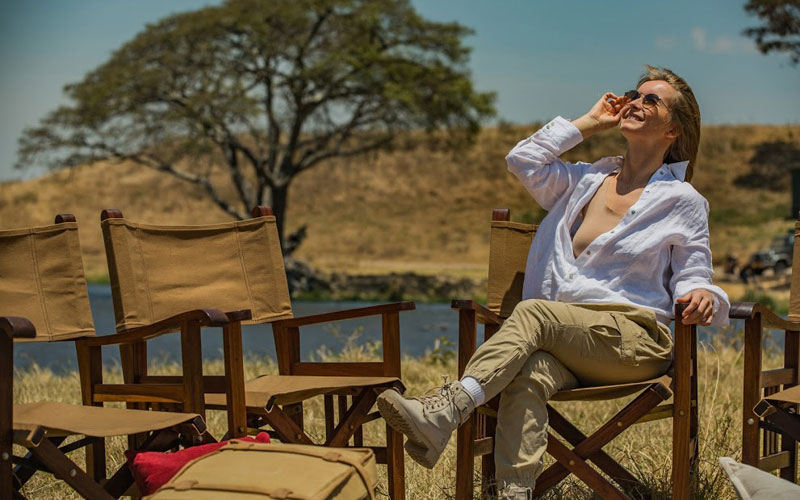

Plan your Safari experience
Check out these amazing deals on epic safari experiences now.
My Final Thoughts
Congratulations! You are ready for your next epic adventure - a camping safari through the remote and picturesque Tanzanian wilderness. Share your thoughts and photos in the comments below. Let's spread the love.

